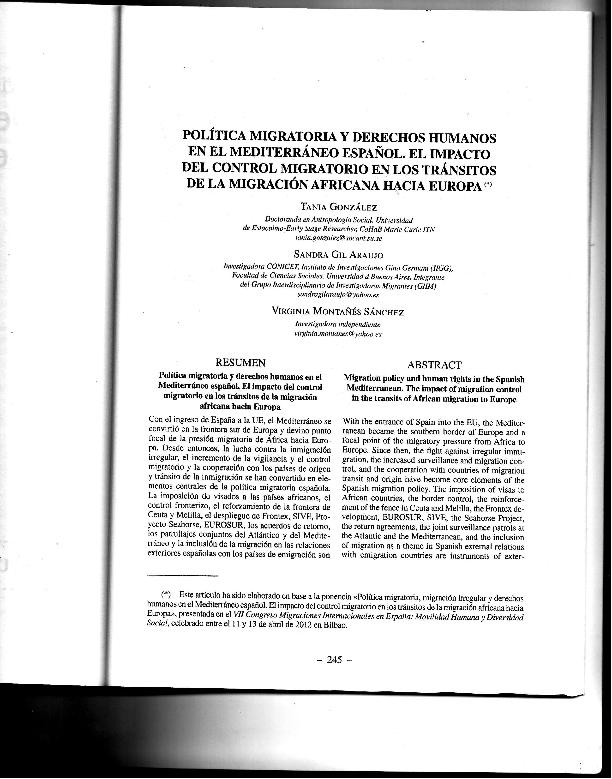Artículo
Con el ingreso de España a la UE, el Mediterráneo se convirtió en la frontera sur de Europa y devino punto focal de la presión migratoria de África hacia Europa. Desde entonces, la lucha contra la inmigración irregular, el incremento de la vigilancia y el control migratorio y la cooperación con los países de origen y tránsito de la inmigración se han convertido en elementos centrales de la política migratoria española. La imposición de visados a las países africanos, el control fronterizo, el reforzamiento de la frontera de Ceuta y Melilla, el despliegue de Frontex, SIVE, Proyecto Seahorse, EUROSUR, los acuerdos de retorno, los patrullajes conjuntos del Atlántico y del Mediterráneo y la inclusión de la migración en las relaciones exteriores españolas con los países de emigración son instrumentos de externalización y europeización de la política migratoria española. En este artículo centraremos nuestra atención en los efectos que el control migratorio de la frontera marítima española tiene en los tránsitos de migrantes procedentes de África. Se tomará como caso de estudio las experiencias de personas migrantes llegadas de manera irregular a las costas andaluzas en el periodo 2010-2011. En particular, nos interesa explorar la vulneración de los derechos fundamentales a lo largo de las distintas etapas que componen el proceso migratorio: desde la salida de su lugar de origen y las experiencia del viaje por tierra, la situación de las personas migrantes en el mar, la interceptación de las embarcaciones, el desembarco y la retención. Analizaremos con mayor detenimiento los procesos de identificación, tratamiento y protección de grupos especialmente vulnerables, y las relaciones de género que atraviesan estas prácticas. With the entrance of Spain into the EU, the Mediterranean became the southern border of Europe and became the focal point of Africa's migratory pressure towards Europe. Since then, the fight against irregular immigration, increased migration surveillance and control and cooperation with countries of origin and transit of immigration have become central elements of Spanish migration policy. The imposition of visas to African countries, border control, reinforcement of the Ceuta and Melilla border, the deployment of Frontex, SIVE, Seahorse Project, EUROSUR, return agreements, joint Atlantic and Mediterranean patrols and the Inclusion of migration in Spanish foreign relations with emigration countries are instruments of outsourcing and Europeanization of Spanish migration policy. In this article we will focus our attention on the effects that immigration control of the Spanish maritime border has on migrant transits from Africa. The experiences of migrants arriving irregularly to the Andalusian coast in the 2010-2011 period will be taken as a case study. In particular, we are interested in exploring the violation of fundamental rights throughout the different stages that make up the migration process: from the departure from their place of origin and the experience of land travel, the situation of migrants at sea, the interception of vessels, landing and retention. We will analyze in greater detail the processes of identification, treatment and protection of especially vulnerable groups, and the gender relations that go through these practices.
Política migratoria y derechos humanos en el Mediterráneo español: El impacto del control migratorio en los tránsitos de la migración africana hacia Europa
Título:
Migration policy and human rights in the Spanish Mediterranean: The impact of migration control in the transits of African migration to Europe
Fecha de publicación:
09/2013
Editorial:
Lex Nova
Revista:
Revista de Derecho Migratorio y Extranjeria
ISSN:
1695-3509
Idioma:
Español
Tipo de recurso:
Artículo publicado
Clasificación temática:
Resumen
Archivos asociados
Licencia
Identificadores
Colecciones
Articulos(SEDE CENTRAL)
Articulos de SEDE CENTRAL
Articulos de SEDE CENTRAL
Citación
Gonzalez, Tania; Gil, Sandra Viviana; Montañes, Virginia; Política migratoria y derechos humanos en el Mediterráneo español: El impacto del control migratorio en los tránsitos de la migración africana hacia Europa; Lex Nova; Revista de Derecho Migratorio y Extranjeria; 33; 9-2013; 245-267
Compartir




